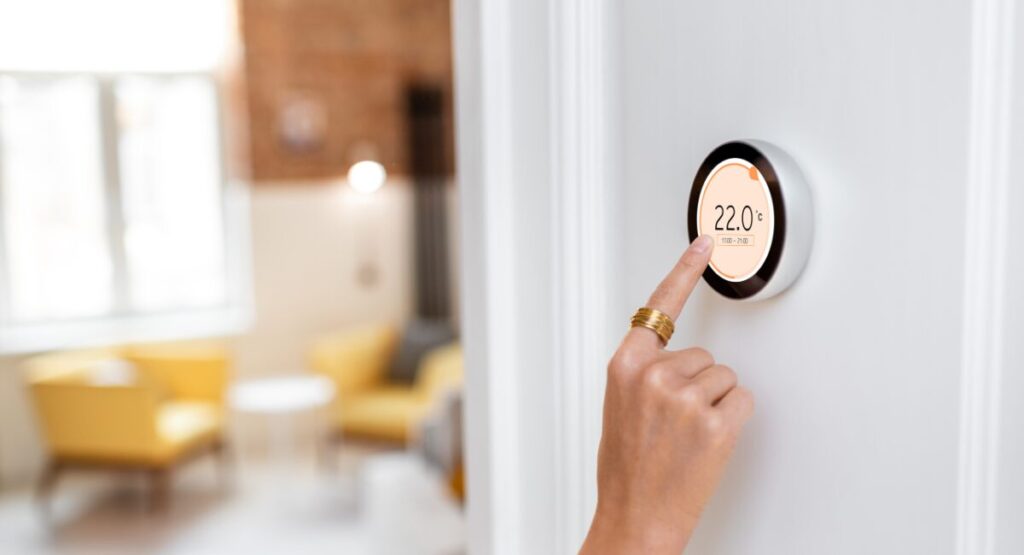
Winter is here, and with it comes the familiar worry of rising heating bills. For those renting a property, it can feel like you’re stuck with whatever the landlord provides. But don’t fret! There are a lot of simple changes you can make that won’t break the bank and will help keep your home warm and your bills in check. And, if you’re not sure what you’re allowed to do in your rental, contact letting agents in Derby to find out what changes might be possible. It’s always better to check before you go ahead with any major fixes.
Let’s dive into some clever ways to save money this winter without sacrificing comfort.
1. Use your heating wisely
Heating is usually the biggest expense during the colder months, so it’s worth making the most of what you’ve got. If you have a thermostat, set it to a temperature between 18°C and 21°C. This is comfortable for most people, and it helps to keep your bills from spiralling out of control. Every degree above that could cost you more, so don’t push it too high.
Don’t leave your heating on all day either. Use the timer setting to heat your home just before you wake up and before you return home in the evening. This way, you’re not heating an empty property. It’s much more efficient.
If you have radiators, get familiar with the valves. Some rooms may not need the heating cranked up, especially if you don’t use them often.
2. Keep out the cold
You’d be amazed at how much heat escapes through the smallest gaps. Drafts can sneak in through doors and windows and make it harder to keep your home warm. The good news is that fixing this doesn’t have to be expensive.
You can pick up draught excluders, foam strips, or thermal curtains from most stores. These are simple and quick fixes that can keep your rooms warmer. If you can’t make permanent changes, consider temporary solutions like sticking up clear plastic film over the windows, or even rolling up a towel at the bottom of your door.
3. Make your curtains work harder
If you’ve got heavy curtains or blinds, use them to your advantage. During the day, keep them open to let in as much natural heat as possible. When night falls, pull them closed to trap warmth inside. It’s a free and easy way to stop your home from cooling down too quickly.
4. Think about your appliances
Most appliances in the home consume more energy than we realise. A simple change of habit can make a noticeable difference. For example, try washing your clothes at 30°C instead of 40°C. It uses less energy, and most detergents work just as well at lower temperatures.
And don’t forget to wait until your washing machine or dishwasher is full before running them. They use just as much energy, no matter how full they are. So, if you’re washing a few items, try to wait until you have a full load.
5. Switch to energy-saving light bulbs
LED bulbs are far more efficient than older, traditional light bulbs. They use less energy, last longer, and are much better for the environment. Plus, they won’t cost you much more upfront than regular bulbs. It’s a no-brainer really.
And while you’re at it, get into the habit of switching lights off when you leave a room. It’s a small thing, but it adds up over time.
6. Track your energy use with a smart meter
If you have a smart meter, use it. It’s a handy way to keep track of how much energy you’re using, and it can help you cut down on waste. You’ll see in real-time what’s using the most energy, which makes it easier to adjust your habits.
If you don’t have one, it might be worth asking your landlord or letting agent if they can arrange to have one installed. It’s often free, and it could save you quite a bit in the long run.
7. Use smaller appliances for cooking
When it’s cold outside, you’re likely to be cooking more, but it doesn’t have to mean big energy bills. The oven takes a while to heat up, and it uses a lot of energy, so consider using smaller appliances like a microwave, slow cooker, or air fryer instead. These use less energy and are much quicker to heat up.
Also, after cooking, leave the oven door open to let the heat escape into the room. Just make sure there’s no risk of small children getting too close.
8. Stop condensation in its tracks
Condensation is a common issue in winter, especially in properties with older windows or less insulation. It can make your home feel colder and cause dampness, which means you’ll need to use more heating to compensate.
To avoid this, make sure to air your home regularly. Open windows for a few minutes each day to let fresh air in, and use extractor fans when cooking or showering. If you’re drying clothes indoors, avoid placing them on radiators, as this increases moisture in the air.
9. Review your energy tariff
Sometimes, simply reviewing your energy tariff can lead to big savings. If you’re on a prepayment meter, consider switching to a standard billing plan, as it could be cheaper.
It takes a few minutes to compare energy prices on comparison websites like Uswitch, and it might be worth switching suppliers if you find a better deal. Even small savings can add up over the course of the winter months.
10. Talk to your landlord or letting agent
If you’re struggling with your heating or energy bills, it might be worth chatting with your landlord or letting agent. They may be able to help you make improvements to the property, such as adding extra insulation, upgrading the heating system, or even applying for grants or energy-saving schemes available in your area.
Sometimes, landlords are open to helping tenants save money on energy costs, especially if it benefits the property in the long run.
Conclusion
The key to lowering your winter payments is making small, possible changes. From adjusting your heating settings to the use of energy-efficient appliances, each little factor provides up. And if you`re not positive wherein to start, don`t hesitate to get in touch with letting agents in Derby for recommendations on a way to make your apartment domestic extra energy-green.
With a touch little bit of attempt and a few ahead planning, you may have a comfy home with out the excessive payments.





